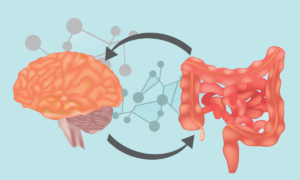 In a “Perspectives” article by Norwitz and Naidoo, published this past February (2021) in the peer-reviewed journal, Frontiers in Psychiatry,1 researchers explored published research supporting nutrition as a means to address underlying metabolic pathologies associated with mental illness—in particular, anxiety. We have summarized the article for our readers and present here what we feel are the key points of the article.
In a “Perspectives” article by Norwitz and Naidoo, published this past February (2021) in the peer-reviewed journal, Frontiers in Psychiatry,1 researchers explored published research supporting nutrition as a means to address underlying metabolic pathologies associated with mental illness—in particular, anxiety. We have summarized the article for our readers and present here what we feel are the key points of the article.
Role of the gut microbiome in managing anxiety. In their article, “Nutrition as Metabolic Treatment for Anxiety,” the authors first emphasized the importance of the gut microbiome in our overall health. The gut microbiome comprises trillions of microorganisms that live in the gastrointestinal tract forming little ecosystems that affect various bodily functions. For example, according to these researchers, gut peptides, which are chemical messengers that regulate gastrointestinal functioning, are thought to modulate anxiety by signaling the amygdala—the part of the brain that activates the fear response—to suppress the threat response once the perceived danger has passed. The release of these gut peptides is regulated by short chain fatty acids, which are produced by certain gut bacteria, and it has been shown that people with anxiety have less of this type of gut bacteria.
Nutritional interventions for anxiety. In this article, the authors suggest specific nutritional interventions that might improve symptoms of anxiety by supporting gut microbiome health. These proposed interventions are 1) avoiding artificial sweeteners, 2) avoiding gluten, 3) including omega-3 fatty acids, 4) including turmeric, 5) supplementing with vitamin D, and 6) following a ketogenic diet. The authors discuss research in support of their proposed interventions, and are careful to note any limitations the cited studies might have. Here we’ve summarized the authors’ discussion and review of these proposed interventions.
1. Avoiding artificial sweeteners. The authors describe research that has shown an association between artificial sweeteners, metabolic dysfunction, and the development of neuropsychiatric problems, such as anxiety; however, the authors note that research is limited to the study of aspartame alone, not other types of artificial sweeteners. The authors suggest that, based on the limited data available, stevia, a natural sugar alternative, may be less likely to cause metabolic dysfunction, but that this is not yet firmly supported by clinical studies.
2. Avoiding gluten. The authors briefly describe gluten’s potential to cause a condition known as “leaky gut,” in which the intestinal lining becomes more permeable, allowing immune-stimulating compounds from the intestine to leak into the bloodstream. This can trigger systemic inflammation and increase the risk for inflammation-induced anxiety. The authors suggest that a gluten-free diet may reduce inflammation-induced anxiety by decreasing risk of leaky gut and its associated systemic inflammation, though research supporting this theory has only been done in individuals with celiac’s disease.
3. Including omega-3 fatty acids in the diet. The authors reviewed beneficial properties of omega-3 fatty acids (eicosapentaenoic acid [EPA] and docosahexaenoic acid [DHA]), describing them as “potent anti-inflammatory signaling molecules that support the microbiome and are important in cognition and mental health,” according to animal and human studies. Human studies have shown that omega-3 supplementation can effectively reduce anxiety, though the benefits are dose- and omega-3 type-dependent. In other words, supplements containing less than 2 grams a day or with lower proportions of DHA were less effective in reducing anxiety, while supplements containing more than 60% EPA had no significant effect on anxiety.
4. Including turmeric in the diet. The authors note the large number of studies that have been conducted regarding the benefits of curcumin (the active component of the spice turmeric). These benefits include improving the gut microbial ecosystem, decreasing systemic inflammation, and moderating levels of dopamine, serotonin, and cortisol, to name a few. Animal and human studies have also suggested that curcumin supplementation can reduce anxiety. However, the authors are careful to point out the limitations of curcumin research, which include the wide variability in supplement purity and formulations from study to study, which make results difficult to reproduce. The chemical instability of curcumin and its ability to interfere with results of lab testing also limit the results of clinical research. Some positive studies incorporated techniques to improve the bioavailability of curcumin and its absorption in study participants. The authors note that more research on bioavailable forms of curcumin, as well as the impact of curcumin on gut bacteria, are needed.
5. Vitamin D supplementation. The authors review the role Vitamin D plays in many neurological functions, including regulating levels of certain neurotransmitters, such as dopamine and serotonin. The authors describe research linking vitamin D deficiency to decreased production of vitamin B by gut bacteria, which can trigger an immune response in the body. Systemic inflammation is linked to anxiety, and vitamin D supplementation has been shown to reduce symptoms of anxiety. The authors note, however, that research has yet to clarify if vitamin D supplementation for anxiety is only effective in the presence of a vitamin D deficiency.
6. Ketogenic diet. Finally, the authors review available data regarding the effects of ketogenic diets (high-fat, low-carbohydrate diets that induce the body to produce ketones) on neurological diseases and mental illness. The authors mention well-established evidence supporting the use of ketogenic diets to manage treatment-resistant epilepsy in children. The authors also mention more recent research touting positive effects of ketogenic diets in patients with neurological conditions, such as Parkinson’s and Alzheimer’s diseases, and in individuals with certain mental health conditions, such as ADHD, schizophrenia, or depression. The authors discuss how ketones produced by the liver can “shift the gut microbiome and improve the gut barrier function.” The authors suggest that induced ketosis may have anti-anxiety effects; however, data supporting this hypothesis are from animal studies only—no human studies examining the effects of ketogenic diets on anxiety have been done. Thus, no solid conclusion regarding the benefits of a ketogenic diet on symptoms of anxiety can be made at this time.
Editor’s notes: The authors hypothesize that specific nutrition interventions can enhance gut microbiome functioning, which in turn may improve or prevent symptoms of anxiety. Additional research is needed to confirm their hypothesis. Consult with a qualified nutritionist or healthcare professional before making sudden or big changes to your diet. Seek help from a qualified mental health professional if you suffer from anxiety.
Source: Norwitz NG, Naidoo U. Nutrition for metabolic treatment for anxiety. Front Psychiatry. 2021;12:598119. Published online 2021 Feb 12. Full access to this article is available here: https://www.ncbi.nlm.nih.gov/pmc/articles/PMC7907178/




